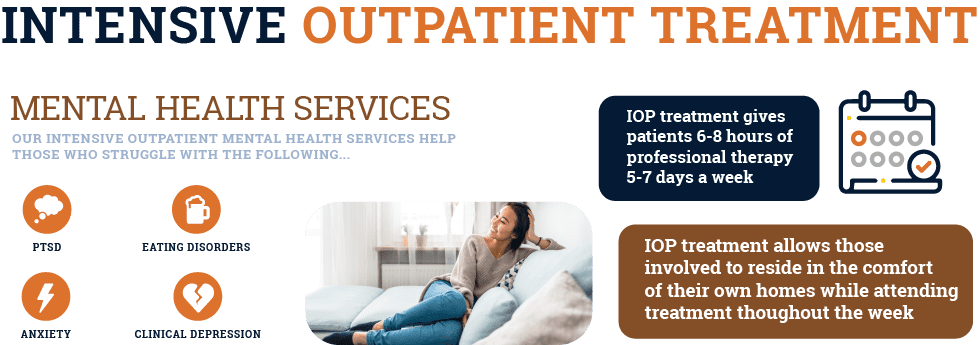If the client’s addiction profile indicates intensive outpatient substance ause treatment would be best, that will be the most likely choice. Our intensive outpatient program helps patients develop the coping skills they need without making them choose between sobriety and commitments.
Intensive Outpatient Program For Substance Abuse in Illinois


What is an Intensive Outpatient Program?
A traditional outpatient treatment program allows the client to report to the facility for counseling sessions regularly. This might encompass 2-3 appointments a week for a couple of hours at a time. If the client is compliant and shows good progress, then they can continue with this treatment option. An IOP may add more structure to an individual’s recovery journey.
IOP Mental Health Services for Co-Occurring Disorders
As substance abuse and mental health disorders often occur at the same time, therapy is crucial to long-term recovery. When someone suffers from mental illness and addiction, it’s known as a co-occurring disorder. Other names include a dual diagnosis or comorbidity. Our intensive outpatient rehab can help clients combat some of the following behavioral health issues:
- Depression
- Eating disorders
- Anxiety disorders (like panic attacks)
- Post-traumatic stress disorder (PTSD)
Intensive outpatient treatment can help manage other mental illnesses as well, but serious cases often require a higher level of care. People with bipolar disorder or schizophrenia need medication management and constant supervision at the start of treatment. Though an IOP may be a suitable option after people with serious mental illnesses complete residential treatment. IOPs can also help cope with other behavioral health issues, like anger management. These types of programs can be highly effective against behavioral health issues that don’t require serious medication management.

Intensive Outpatient Substance Abuse Treatment Expectations
The requirements for this type of program are simple. The client has to stay sober, meet all scheduled appointments and show good progress. In cases where individuals are unable to abide by these rules, a more intensive program may be necessary. This might mean individuals may need to consider residential treatment instead.
How Long Does IOP for Drug and Alcohol Addiction Last?
Is an IOP for Substance Abuse Right for Me?
Life-threatening addictions need aggressive medical attention. That isn’t something that an IOP can provide around the clock. Trying to jump into outpatient care before detox or inpatient care for those suffering from a severe substance use disorder can be dangerous. Also, people who have had a relapse after already attending an IOP in the past should consider another program.
Insurance Coverage and IOPs
Another factor to think about before choosing an addiction treatment program in Illinois is whether or not insurance will cover it. It’s true that insurance providers must treat addiction like any other physical health issue.
That doesn’t mean that they will provide enough coverage to help you pay for outpatient care. Our recovery center can help you verify your insurance to make sure that an IOP makes sense for your budget.
Why Choose Intensive Outpatient Substance Abuse Treatment?
Of course, there are several viable reasons why we offer intensive outpatient treatment at our addiction treatment center. There are a number of reasons why clients prefer this option:
- Financial obligations that require the client to keep working
- Primary care responsibilities for a child or elderly parent
- Affordability (less expensive than residential treatment)
- Follow-up to a residential treatment program
- Work or school responsibilities
Across all our programs, including our intensive outpatient program for substance abuse, clients can take advantage of numerous therapies to address their specific needs. We offer therapies such as:
- Family therapy
- Yoga therapy
- Individual therapy
- Cognitive behavioral therapy (CBT)
- Dialectical behavior therapy (DBT)
- Group therapy and support groups
In family therapy, family members learn how to help their loved ones overcome addiction without enabling them. This type of therapy can be powerful in tandem with holistic treatment (e.g. yoga therapy) and traditional psychotherapy (CBT and DBT).
Our large selection of therapies makes it easier to help clients find what works best for them. Treatment can always be adjusted as an IOP continues.
Types of Addictions Treated in Intensive Outpatient Programs
Since over 5,000 people pass away from alcohol or drugs in Illinois, it’s better to get help than get none at all. Certain substances have a stronger threat in Northern Illinois, contributing to a large chunk of this statistic.
Despite overwhelming research that shows the dangers of drinking, people still develop alcohol use disorders. When people become addicted to alcohol it makes it almost impossible to quit drinking without experiencing physical and mental withdrawal. After managing physical withdrawal symptoms in detox, many clients attend alcohol IOP treatment.
Opioids are one of the most addictive drugs in the United States. Illinois is no exception. According to the National Institute on Drug Abuse, “nearly 80% of drug overdose deaths involved opioids in 2018”.
Many people start off with prescription opioids and eventually succumb to using heroin. Because of how dangerous opioids are, it’s essential to get treatment quickly. After residential treatment, an IOP can act as a bridge between getting back to normal life and continuing treatment.
While opioids and alcohol present a deadly issue to those in Illinois, many people admit themselves to treatment for meth. Meth isn’t as deadly but can still be difficult to quit without professional help from an addiction treatment facility.
Our intensive outpatient rehab program offers a solution for those without a severe meth addiction who can’t live on-site. Clients with severe addictions should seek more intensive treatment.

Offering Top Intensive Outpatient Substance Abuse Treatment
This also allows our counselors and clinicians to choose and customize addiction treatment plans for each client. At the end of the day, our success depends on the ability of our clients to remain in recovery long-term. Here are of our some of our treatment programs and services:
- Outpatient and intensive outpatient programs
- Primary inpatient and extended (more than 90 days) inpatient programs
- Aftercare programs like sober living homes
- Dual diagnosis treatment
- Partial hospitalization
If you have an addiction to any substance but can’t enroll in inpatient care, an intensive outpatient program might be the best choice for you. Addiction is a disease that claims victims every day.
We hope you can avoid being one of those victims by waking up and reaching out for help. Our counselors and clinicians at Northern Illinois Recovery Center are ready to help you when you do. We encourage you to contact us for relevant information about our detox and addiction treatment services.





